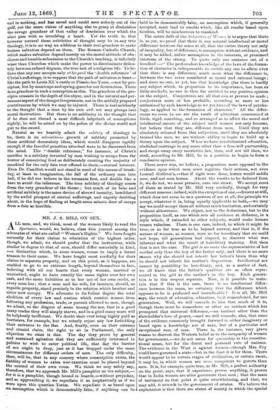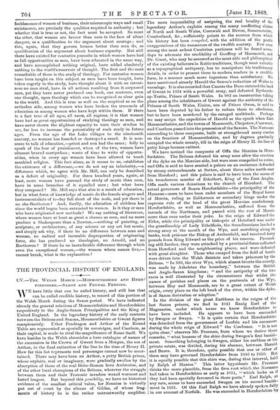MR. J. S. MILL ON SEX.
ALL men, and, we think, most of the women likely to read the Spectator, would, we believe, class this journal among the advocates of what are called " Women's Rights." We have fought earnestly for their claims to education of the highest order, though, we admit, we should prefer that the instruction, while similar in degree to that of men, should differ materially in kind, —a distinction which, to some women, seems to imply a latent treason to their cause. We have fought most cordially for their claims to separate property, and on this point, as it happens, are enabled to go to an extreme length, beyond themselves in fact, believing with all our hearts that every woman, married or unmarried, ought to have exactly the same rights over her own cash, and the same liabilities as to her use of her own credit, as every man has ; that a man and his wife, for instance, should, as regards property, stand precisely in the relation which brother and sister now occupy. We advocate to its fullest degree the total abolition of every law and custom which restrict women from following any profession, trade, or pursuit allowed to men, though we admit, to the disgust of some among the sex, that in a good many trades they will simply starve, and in a good many more will be helplessly inefficient. We doubt their ever being highly paid as barristers, for example, but we utterly reject any law forbidding their entrance to the Bar. And, finally, even on their extreme and crucial claim, the right to sit in Parliament, the only objection we raise is this. The day they prove by general and sustained agitation that they are sufficiently interested in politics to wish to enter political life, that day the barrier of sex ought to drop, just as it has dropped under the same circumstances for different orders of men. The only difficulty, then, will be, that in any country where conscription exists, the *liability of women to extra war-taxation must be placed beyond the control of their own votes. We think we may safely say, therefore, that we approach Mr. Mill's pamphlet on the subject,— for it is a pamphlet, though bound in boards,—without prejudice, and so approaching it, we repudiate it as emphatically as if we were upon this question Tories. We repudiate it as based upon an assumption which is demonstrably false, if anything can be
held to be demonstrably false, an assumption which, if generally accepted, must lead to results which, like all results based upon falsities, will be mischievous to mankind.
The entire drift of the Subjection of Women is toargue that there is, as yet, no proof that there is any natural intellectual or moral difference between the sexes at all, that the entire theory not only of inequality, but of difference, is assumption without evidence, and it may be added, unfair assumption in the interests, or presumed interests, of the strong. To quote only one sentence out of a hundred :—" The profoundest knowledge of the laws of the formation of character is indispensable to entitle any one to affirm even that there is any difference, much more what the difference is, between the two sexes considered as moral and rational beings ; and since no one, as yet, has that knowledge (for there is hardly any subject which, in proportion to its importance, has been so little studied), no one is thus far entitled to any positive opinion on the subject. Conjectures are all that can at present be made ; conjectures more or less probable, according as more or less authorized by such knowledge as we yet have of the laws of psychology, as applied to the formation of character." All the differences we seem to see are the result of education commenced at birth, rigid, searching, and so arranged as to affect the moral and intellectual nature of the subject until women not only become, but believe that they are, different from men. Until they are absolutely released from this subjection, until they are absolutely treated like men, we are without ability to begin to build up a theory upon the subject. When we have revolutionized education, abolished marriage in any sense other than a free-will partnership, and swept away every restrictive law, then, and not till then, wo shall, according to Mr. Mill, be in a position to begin to form a conclusive opinion.
There never was, we believe, a proposition more opposed to the evidence upon which men must regulate their actions, not even Lemuel Gulliver's,—that if right were done, horses would saddle men, and not men horses. About the results to be deduced from it, we do not, we must premise, care one straw. We accept most of them as stated by Mr. Mill very cordially, though for very different reasons; indeed, with the exception of one,—divorce at will, which does not seem to us a question of sex at all, the principle we accept, whatever it is, being equally applicable to both,—we may say we could accept them all without much hesitation, and certainly without abhorrence. We object, not to the deductions, but to the proposition itself, as one which sets all evidence at defiance, in a style which, if extended to other subjects, would make human reason valueless. There is one case, indeed, in which it might be true, or so far true as to be beyond answer, and that is, if the nature of women, as women, were so far hereditary that we could not hope, till generations had elapsed, to discover what was inherent and what the result of hereditary training. But then that is not the case. The girl is no more the representative of her mother only than the boy of the father only, and there is no more reason why she should not inherit her father's brain than why he should not inherit his mother's disposition. Intellectual sex cannot by possibility be hereditary, and, as a matter of fact, we all know that the father's qualities arc as often represented in the girl as the mother's in the boy. Each generation is in this respect separate. Now, is it possible to maintain that if this is the case, there is no intellectual difference between the sexes, no certainty that the difference which appears to be is profound and ineradicable ? It is all, Mr. Mill says, the result of education, education, be it remembered, for one generation. Well, we will concede to hint that much of it is, though there must be somewhere or other an instinct which has prompted that universal difference,—an instinct other than the slaveholder's love of power,—and we will concede, also, that some of the evidence commonly brought forward is either imaginary or based upon a knowledge not of man, but of a particular and exceptional race of men. There is, for instance, very grave reason to distrust the Western belief as to the incapacity of women for government,—we do not mean for queenship in the constitutional sense, but for the direct and personal rule of nations. The evidence in the West is against women—though Mrs. Fry could have governed a state—but in the East it is for them. There would appear to be certain stages of civilization, or certain races, it may be, in which women are more competent to govern than men. It is, for example, quite true, as Mr. Mill, a perfect authority on the point, says, that if experience proves anything, it proves that in India women are abler governors than men ; that the mass of testimony on that point is quite overwhelming, and that, we may add, it extends to the government of estates. We believe the explanation is that there are states of society in which the special feeblenesses of women of business, their microscopic ways and small strictnesses, are precisely the qualities required in authority ; but whether that is true or not, the fact must be accepted. So must the other, that women are braver than men in the face of silent dangers, as a qualification to the argument about courage ; and this, again, that they govern houses better than men do, as qualification of the argument about business capacity. But still there have existed for centuries pursuits in which women have had as full opportunities as men, have been educated in the same way, and have accomplished nothing original, have added absolutely nothing to the world's reservoir of thought. The first and the most remarkable of these is the study of theology. For centuries women have been taught on this subject as men have been taught, have taken eagerly to the study, have thought about it with an intentness no men rival, have in all actions resulting from it surpassed men, yet they have never produced one book, one sentence, even one thought, upon theology which can be recognized as clear gain to the world. And this is true as well on the sceptical as on the orthodox side, among women who have broken the trammels of education as among women who have kept within them. If there is a fact true of all ages, all races, all regions, it is that women have had as great opportunities of studying theology as men, and have never shown the slightest capacity to turn their studies to us; far less to increase the potentiality of such study in future ages. From the age of the 'Ake villages to the nineteenth century, no woman has founded or destroyed a creed. It is nonsense to talk of education,—priest and nun had the same ; folly to speak of the fear of punishment, when of the two, women have oftenest braved martyrdom ; waste of time to write of opportunities, when in every age women have been allowed to teach mankind religion. This fact alone, as it seems to us, establishes the existence of a difference,—we do not say an inferiority,—a difference which, we agree with Mr. Mill, can only be described as a defect of originality. For three hundred years, again, at least, more women have pursued the study of music than men, have in some branches of it equalled men ; but what have they composed ? Mr. Mill says that also is a result of education, but in what form of knowledge of music do the female singers and instrumentalists of to-day fall short of the male, and yet there is no she-Beethoven ? And, finally, the education of children has since the world began been entrusted to women. Is it they or men who have originated new methods? We say nothing of literature, where women have at least as great a chance as men, and no more produce a Shakespeare than a Newton,—nothing of painting, or sculpture, or architecture, of any science or any art but music, and simply ask why, if there be no difference between man and woman, no radical and incurable disproportion of originating force, she has produced no theologian, no Arnold, and no Beethoven ? If there be no ineradicable difference through which even the exceptional women,—the women whose names live,— cannot break, what is the explanation ?































 Previous page
Previous page